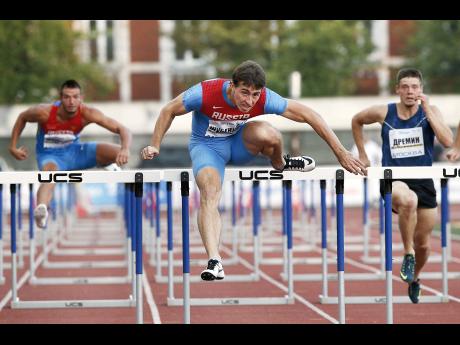Whither Russia?
When the curtain fell on the 2013 IAAF World Championships in Moscow, hosts Russia stood proudly atop the medal table. Though the powerful American team had more medals overall, Russia had seven gold medals in its collection of 17.
Two years later, at the height of the crackdown on reported Russian doping bandooloo, Russia managed to win just four medals at the World Championships in Beijing. Among that quartet of podium places were two gold medals, won by the high jumper now known as Mariya Lasitskene, and by Sergei Shubenkov in the 110 metre hurdles.
The difference between the 2013 and 2015 medal returns suggests that the crackdown worked. At last year's World Championships, Russians competed as World Anti-Doping Agency (WADA)-approved Authorised Neutral Athletes. That group won six medals, with Lasitskene winning again. Shubenkov took silver behind Omar McLeod.
Even though the Authorised Neutral Athletes don't compete in relays, where the Russian women and their compatriots in the men's 4x400 metres were very strong in 2013, it still seems that the crackdown has worked.
REINSTATING RUSADA
However, the matter is more complex than that. There is strong sentiment against the reinstatement of the Russian Anti-Doping Agency (RUSADA), the Russian arm of WADA. One key requirement, by the IAAF, is for public admission of government involvement in sample swapping during the build-up to the 2014 Winter Olympic Games in Sochi. You must wonder if that will ever come.
In the meantime, WADA is content that Russia has done much to comply with its requirements. The new position requires RUSADA to continue on that path. Only time will tell if this will help to pry open the door to the next Olympics for athletes like Lasitskene, Shubenkov, World long jump silver medallist and fashion model Darya Klishina, and Danil Lysenko, the World Indoor high jump men's champion.
Of note, Lysenko was stripped of his Neutral Athlete authorisation in August for missing doping tests.
It's ironic that while all that has been going on, Russia has hosted the FIFA World Cup. In part because of the isolation of Russian sport at the Olympic level, the home team developed a fan base as far and wide as here in Jamaica. As the Russians battled their way out of the first round of group play and into the quarterfinals, one admirer told me that she dreamt that they would win the World Cup.
In a tournament filled with upsets, and in a sport where home teams have had great success, her dream didn't seem too outlandish at the time.
In the middle of the dilemma is the plight of the clean Russian. As Shubenkov told the BBC in 2016, "People who have been taking drugs anywhere should be punished and I have no tolerance for them, but today, I am punished and I am a clean athlete." He applied to compete in Rio as a neutral, but his application was denied.
Bitterly disappointed, he lamented, "Retest me anytime you want, come to me every day." His protestations, and those at the time of pole vaulter queen Elena Isinbayeva, vent an additional concern. While sport is damaged if doping runs free, the sport's authorities have the fate of clean athletes everywhere in their hands.
In track and field, the IAAF World Championships are athletically the equal of the Olympics, but tradition and the four-year wait for each Games gives the festival formed in 1896 an extra special place in the heart of sportsmen and fans alike.
The WADA decision has rolled the ball into the court of the International Olympic Committee. With the 2020 Games just over the horizon in Tokyo, Japan, the committee must now decide whether Russians can compete there should Shubenkov and company apply to compete as neutrals. It's a tough choice.
- Hubert Lawrence has made notes at track side since 1980.

